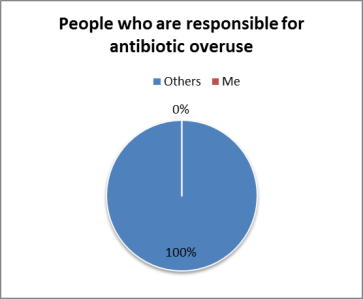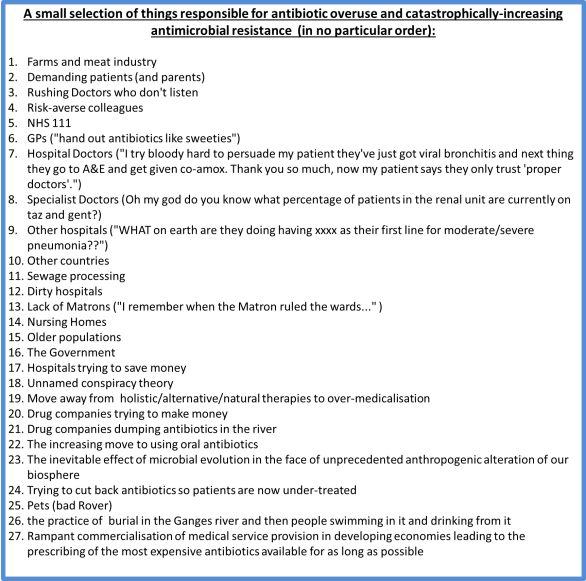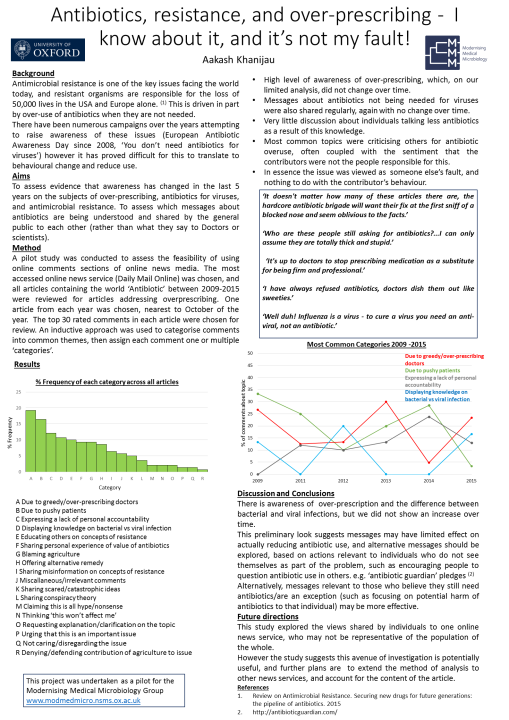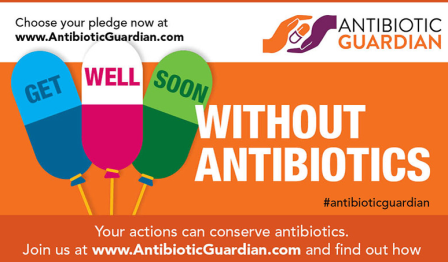
When I talk to my hospital colleagues, and my patients, about antibiotics, overuse, and resistance, there is certainly no lack of awareness. Unprompted I frequently get told exactly what the problem is.

There’s one answer I rarely get.
“I’m probably part of the problem, and I am changing what I am doing, to do my bit”.
—–
Is this reflected in what is said online?
As part of my work at ModMedMicro, I recently had a student doing a project on antibiotic resistance and antibiotic over-use in online media. This was to find out out what ideas are being shared by members of the general public. ‘What’s out there? Are any of these public awareness campaigns having any impact? We looked at articles talking about over-use of antibiotics, and the comments.
What we found:
-
- It’s very hard to do a meaningful quantitative analysis on very different articles, nevertheless:
- People commenting generally seem to know about the fact we over-use antibiotics
- It’s not their fault

Actually, this is a bit of an overgeneralisation. We found quite a lot of things were being talked about. But it was true that many people could tell you which group were at fault (e.g. demanding mothers), and unsurprisingly it was always ‘other people’. When it came to themselves it was ‘but I’m an exception’ – ‘I have bad asthma, I’m very susceptible’… Alternatively it was big pharma/government/conspiracy theory.
There was, as stated previously, very little saying ‘I’m doing something about it’ or ‘I’ve changed what I do’.
Our student’s conclusion was that whilst there was successful communication with the public about the message that antibiotics were being overused (and antibiotics weren’t effective for viruses), there needed to be more practical, achievable actions given to people, rather than just ‘be aware of it’. He highlighted the ‘Antibiotic Guardian‘ campaign as an example of this done well.
We know this was a really small look by a med student in about 2 weeks, and far from perfect. It looked only at one, highly-commented , highly-accessed media source. (Sorry, yes, the Daily Mail Online…). It was just to see how feasible it was.
Nevertheless, it certainly fits in with other things I’ve noticed in the past – all this ‘Antibiotic Doomsdaying’ – what’s the point if you’re just going to depress everyone? You need to give people something they’re able to do.
So we’re going to take up his very sensible suggestion, and when we do public engagement about antimicrobial resistance or prescribing in the future, as part of it we’re going to direct people to the Antibiotic Guardian website. And we’re going to say:
Antibiotics and superbugs – Whether or not you’re part of the problem – be part of the solution. “DO YOUR BIT”.

——————-
If anyone is interested in this area of work, or is doing something similar, do get in touch! nicola.fawcett [at ] ndm.ox.ac.uk. The student who did the work is Aakash Khanijau, a 2nd year clinical student at Oxford.
———————
Other small bits of interest:
- The message about antibiotics not being useful for viruses is ‘out there’ and highly repeated by this subset of commenters.
- Mentioning food/agricultural use of antibiotics was evident in 2009, long before it became big in the scientific and international press, to my surprise.
- There was quite a bit on how antibiotics might ‘lower your natural immunity’, and equally people discrediting this view. But it did have me thinking, given we know antibiotics can deplete host microbiota, and leave one more susceptible to some infections, like C diff. (+streptococcal infections and colonisation with MDROS in mice). And increase risk of UTIs in patients with asymptomatic bacteruria. It made me think that this isn’t a totally crazy line to consider. Ultimately, our commensals are ‘natural immunity’, and if this is a phrase people can understand and works psychologically, then perhaps we should be thinking again.
—————–
More notes:
As a brief method, we trawled the Daily Mail Online, and we pulled all articles on over-use of antibiotics, over a 6 year period (where comments were available), and did a thematic analysis, to see 1) what the most commonly shared views were, and 2)whether they changed over time. We chose the Daily Mail as a first try because it was by far the most commented news site. We found the articles were probably too different, and the comments too affected by the article angle, (and sometimes the numbers too small) to do a meaningful analysis with the current method and resources (1 keen med student), but there was no stonkingly obvious evidence of changes over time.
Also insert the big limitations statement that Daily Mail Commenters are probably not representative of the population as a whole, and Daily Mail Commenters on antibiotic articles are more likely to know/feel strongly about the issue. If we continue the project we’d aim to get a range of online media. We briefly looked at a few before choosing the Daily Mail as the easiest.
——————-